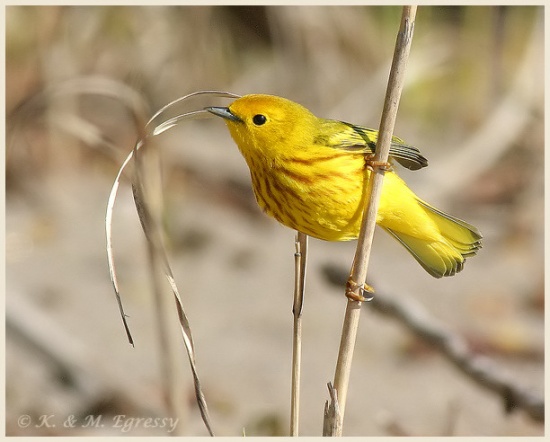m |
|||
| Line 1: | Line 1: | ||
;Dendroica petechia | ;Dendroica petechia | ||
| − | [[Image:Yellow_Warbler.jpg|thumb| | + | [[Image:Yellow_Warbler.jpg|thumb|550px|right|Photo by kegressy]] |
==Description== | ==Description== | ||
| − | + | This is one of the most widespread warblers, showing great geographical variation. In the tropical parts of its breeding range this bird nests mainly in mangrove swamps, and there it may have a chestnut head or crown patch. In temperate North America the Yellow Warbler is one of the principal victims of the cowbird, which lays its eggs in the nests of other birds. A cowbird lays only one egg per foster nest, but she may lay eggs in four or five nests in a short time, thus jeopardizing many broods. If the female Yellow Warbler discovers a cowbird parasitizing her nest, she quickly covers the alien egg with a new foundation and lays another clutch. Occasionally a nest is found with up to six layers, each containing one cowbird egg. | |
| + | |||
==Identification: == | ==Identification: == | ||
| − | + | 4 inches in length; thin, pointed bill; mostly yellow plumage; upperparts greenish-yellow; yellowish legs; plain yellow face with yellow eye ring around a dark eye. Male: Plumage golden yellow; rusty streaks on breast and flanks. Female and immature: Plain yellow plumage; streaks on the breast are absent or barely noticeable; some have pale gray wash to plumage (southwestern US). | |
| − | + | ||
==Habitat: == | ==Habitat: == | ||
| − | + | Moist thickets, especially along streams and in swampy areas; gardens. | |
| − | + | ==Range== | |
| − | == | + | Breeds from Alaska east across Canada to Newfoundland and south to southern California, northern Oklahoma, and northern Georgia; local in southern Florida. Winters in tropics. |
| − | + | ==Behaviour== | |
| − | + | Voice: Song a bright, musical sweet-sweet-sweet, sweeter-than-sweet. Call a sharp chip. | |
| − | + | Nesting: 4 or 5 pale blue eggs, thickly spotted with brown, in a well-made cup of bark, plant fibers, and down, placed in an upright fork in a small sapling. | |
| − | == | + | ==External Links== |
| − | + | {{GSearch|Dendroica+petechia}} | |
| − | |||
| − | |||
| − | |||
| − | |||
| − | |||
| − | |||
| − | |||
| − | |||
| − | |||
| − | |||
| − | |||
[[Category:Birds]] | [[Category:Birds]] | ||
Revision as of 18:20, 19 May 2007
- Dendroica petechia
Description
This is one of the most widespread warblers, showing great geographical variation. In the tropical parts of its breeding range this bird nests mainly in mangrove swamps, and there it may have a chestnut head or crown patch. In temperate North America the Yellow Warbler is one of the principal victims of the cowbird, which lays its eggs in the nests of other birds. A cowbird lays only one egg per foster nest, but she may lay eggs in four or five nests in a short time, thus jeopardizing many broods. If the female Yellow Warbler discovers a cowbird parasitizing her nest, she quickly covers the alien egg with a new foundation and lays another clutch. Occasionally a nest is found with up to six layers, each containing one cowbird egg.
Identification:
4 inches in length; thin, pointed bill; mostly yellow plumage; upperparts greenish-yellow; yellowish legs; plain yellow face with yellow eye ring around a dark eye. Male: Plumage golden yellow; rusty streaks on breast and flanks. Female and immature: Plain yellow plumage; streaks on the breast are absent or barely noticeable; some have pale gray wash to plumage (southwestern US).
Habitat:
Moist thickets, especially along streams and in swampy areas; gardens.
Range
Breeds from Alaska east across Canada to Newfoundland and south to southern California, northern Oklahoma, and northern Georgia; local in southern Florida. Winters in tropics.
Behaviour
Voice: Song a bright, musical sweet-sweet-sweet, sweeter-than-sweet. Call a sharp chip. Nesting: 4 or 5 pale blue eggs, thickly spotted with brown, in a well-made cup of bark, plant fibers, and down, placed in an upright fork in a small sapling.




